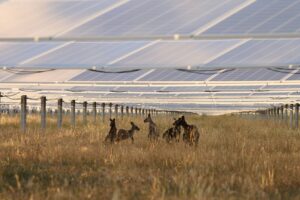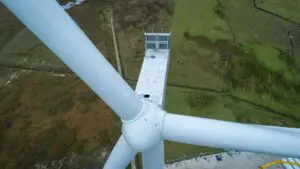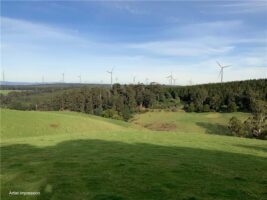Less than a month after unveiling plans to develop a 50-150MWh battery storage facility on the South Australian electricity network, Adelaide-based outfit ZEN Energy has flagged the rollout of a baseload renewable energy product, targeting commercial and industrial users in the state.
ZEN’s retail electricity product was revealed on Tuesday alongside the company’s new partnership with South Australian company, Santos, whose gas will offer last-line back-up generation to ZEN’s solar and storage facilities.

ZEN – which has graduated from a solar installation business founded by Richard Turner to being Australia’s first dedicated community renewable energy provider, chaired by University of Melbourne economics professor Ross Garnuat – has for the past 15 months focused on the potential for large-scale solar projects to operate alongside battery storage systems to service large-scale electricity users and help balance the grid.
The company’s retail electricity product will be based on large-scale solar power generation the company is currently developing ,supported by battery storage in the Upper Spencer Gulf, while also tapping South Australia’s abundance of cheap wind power at night to replenish the battery storage, and using gas generation as “back-up to the back-up.”
Speaking in Adelaide on Tuesday morning, Garnaut told RenewEconomy that the overall package would see the company able to offer to South Australian commercial and industrial users long-term contracts that are lower priced than long-term contracts now available in most parts of south and eastern Australia.
“The core of the competitiveness of the product, is that large-scale solar is now the cheapest form of energy… significantly less than half the cost of the gas in gas generation,” Garnaut said.
“So if you’ve got a big core of solar, you can bring in the complementary renewables for the night, you (can) back it up with batteries, and through our partnership with Santos, we’ll have arrangements in place where we can back up the back-up with gas generation.”
The concept mirrors comments made last week by Tesla’s head of energy products, Lyndon Rive, who told journalists in Melbourne that battery storage has helped propel renewable energy “from being the supplementary energy source, to now becoming the primary fuel source, and fossil fuel will be the supplementary energy generation resource – which is the right place to be.”
Rive also suggested that Tesla, using its newly launched range of second generation grid-scale Powerpack battery storage systems, could solve South Australia’s energy security problems in just 100 days, by installing between 100-300MWh of battery storage. This claim was then backed up on the weekend by Tesla founder Elon Musk, who upped the ante by suggesting Tesla would install 100MW of grid-connected battery storage in 100 days, or install it for free.
But as ZEN Energy noted last month, some regulatory work needs to be done before Australia can start the rollout of grid-scale battery storage; particularly in the market for fast response frequency control of the kind that batteries are ideally placed to provide – and which is currently dominated by incumbent gas and coal power generators.
Garnaut says that in ZEN’s model, battery storage not only provides the first line of back-up power generation – the fast response back-up – but other key functions that make it ideal to provide cheap, reliable 24-hour renewable electricity.
“Large-scale battery storage has come down enough in cost to have an economic role in the system,” he told RE.
“First of all you need it to make sure you’ve got even power throughout the day… then with the storage in the battery you can run the solar into the early peak in the evening, (and then) refill the battery when wind’s cheap in SA overnight, so you’ve got it for the morning peak.”
Bringing Santos into the equation, he says, provides a further layer of insurance.
“All of the fast response requirements of balancing the renewables are there with the big battery, but there are circumstances when you need to back that up with other facilities, and ZEN’s partnership with Santos will put in the capacity to back it all up so that it is more secure than is currently available in the grid.
“It’s what will give us security. …You can always get some security with purely financial derivatives, but if you’ve got a physical back-up, you’ve got really secure supply,” he said.
For Santos, the partnership opens a door to renewables as a cleaner, cheaper industrial power source.
“The partnership also opens up exciting opportunities for Santos to introduce solar energy into our gas processing and transport operations in South Australia and Queensland, lowering our production costs and freeing up gas for release into the domestic Australian market,” said Santos Managing Director and CEO Kevin Gallagher








